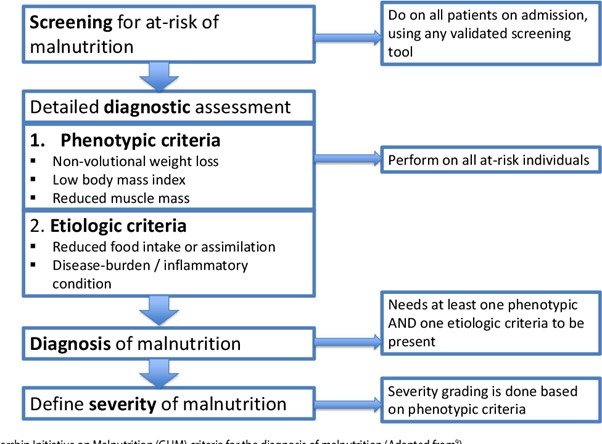The nurse is caring for a client who has been diagnosed with malnutrition. Which finding supports the medical diagnosis?
Body mass index (BMI) of 17.
Decrease in the appetite.
Dry mucosal membranes.
Weight of 227 pounds (103 kg).
The Correct Answer is A
Choice A
Body mass index (BMI) of 17 is the correct finding. A low Body Mass Index (BMI) is a common indicator of malnutrition. BMI is a measurement that considers a person's weight in relation to their height. A BMI of 17 suggests that the person is underweight, which can be indicative of malnutrition. Malnutrition is characterized by inadequate intake of calories, protein, vitamins, and minerals that are essential for maintaining health and well-being.
Choice B
Decrease in appetite is not correct finding. While a decrease in appetite might contribute to malnutrition, it's a symptom rather than a definitive indicator.
Choice C
Dry mucosal membranes are not the correct finding. Dry mucosal membranes can be related to dehydration or other conditions, but they are not specific enough to confirm malnutrition on their own.
Choice D
Weight of 227 pounds (103 kg) is not the correct finding. This weight is not necessarily indicative of malnutrition on its own. It's important to consider the individual's height, BMI, and other factors when assessing malnutrition.

Nursing Test Bank
Naxlex Comprehensive Predictor Exams
Related Questions
Correct Answer is D
Explanation
Choice A
Nuts is incorrect. Nuts are a good source of healthy fats, including monounsaturated and polyunsaturated fats, which can actually have a positive impact on heart health. They have been associated with improving HDL cholesterol levels and can be a part of a heart-healthy diet. While nuts are calorie-dense, small portions can be included as part of the client's diet to replace less healthy snacks. Therefore, nuts might not need to be completely avoided.
Choice B
Shellfish Is incorrect. Shellfish, including shrimp, crab, and lobster, are relatively low in saturated fat and cholesterol. While they do contain cholesterol, dietary cholesterol has less impact on blood cholesterol levels compared to saturated and trans fats. The client's main concern is elevated LDL cholesterol, which is influenced more by saturated fat intake. Therefore, avoiding shellfish might not be as crucial as focusing on saturated fat sources.
Choice C
Eggs is incorrect. Eggs are a source of dietary cholesterol, but they also provide essential nutrients. Recent research suggests that dietary cholesterol from foods like eggs has less impact on blood cholesterol levels for most people than was previously thought. For the client, the more significant concern is the elevated LDL cholesterol level. If the client enjoys eggs, they might not need to completely avoid them, but they should consume them in moderation and consider other dietary changes to reduce saturated fat intake.
Choice D
Cheese is correct. Cheese is often high in saturated fats, which can contribute to elevated LDL cholesterol levels. Therefore, it would be important for the client to limit their intake of high-fat cheeses.
Correct Answer is B
Explanation
Choice A
Drinking a litre of water during and after running is not appropriate: While hydration is important, consuming plain water might not be sufficient to address electrolyte imbalances that can contribute to leg cramps. Drinking excessive amounts of water without electrolyte replacement can even lead to a dilution of electrolyte levels.
Choice B
Consuming a sports drink before and during training is appropriate. Sports drinks are formulated to provide not only hydration but also electrolytes like sodium, potassium, and sometimes magnesium. These electrolytes are important for proper muscle function and can help prevent cramps. Consuming a sports drink before and during training can help maintain electrolyte balance and reduce the risk of leg cramps.
Choice C
Eating a high carbohydrate meal after running is not appropriate. Carbohydrates are important for refuelling muscles after exercise, but this recommendation doesn't directly address the issue of leg cramps during training. Electrolytes like sodium, potassium, and magnesium play a role in muscle function and can help prevent cramps.
Choice D
Avoid drinking alcohol forty-eight hours before training is not appropriate. While avoiding alcohol before training is generally a good idea for hydration and performance reasons, it doesn't specifically address the issue of leg cramps. Electrolyte balance is more directly related to muscle cramping.
Whether you are a student looking to ace your exams or a practicing nurse seeking to enhance your expertise , our nursing education contents will empower you with the confidence and competence to make a difference in the lives of patients and become a respected leader in the healthcare field.
Visit Naxlex, invest in your future and unlock endless possibilities with our unparalleled nursing education contents today
Report Wrong Answer on the Current Question
Do you disagree with the answer? If yes, what is your expected answer? Explain.
Kindly be descriptive with the issue you are facing.
